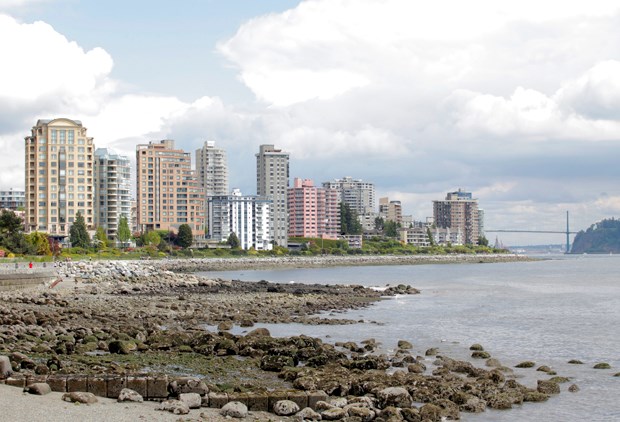Members of North Vancouver’s Tsleil-Waututh Nation who went to English Bay Thursday morning to see oil washing up on the beach say the oil spill has only heightened their concerns about a possible environmental disaster from oil tanker traffic.
Rueben George and Carleen Thomas, members of the nation’s Sacred Trust Initiative set up to oppose Kinder Morgan’s pipeline expansion, said they were alarmed at how little information was being shared with the public after a freighter started spilling bunker oil Wednesday evening.
“I’m very, very concerned about how ill-equipped we are for a disaster,” said George.
George said as he and Thomas walked along the beach they could smell the oil drifting in to shore. Remnants of oil remained on shells, rocks and seaweed Thursday morning, said George, who added he went to English Bay to see the impacts first-hand.
“I wanted to see how bad it was,” he said. “Eighty-five per cent of our traditional diet comes out of that water. I wanted to see the damage.”
Authorities were first alerted to an oil spill from a freighter anchored off English Bay around 5 p.m. Wednesday, when a boater reported seeing an oily sheen on the water, said Julia Ren, a spokeswoman with Port Metro Vancouver.
At the time, “We were told (the oil) was light and unrecoverable,” said Ren.
Only later in the evening did the authorities realize the oil was thicker and the spill more serious than first thought.
Crews set up a containment boom around the grain ship Mathahassa sometime after 9 p.m. and began emergency cleanup operations.
But other agencies — including the City of Vancouver, local North Shore municipalities and the public — weren’t told about the spill until early Thursday morning.
Jeff McDonald, spokesman for the District of West Vancouver, said he didn’t receive word on the oil spill until emails were sent in the middle of the night — which he didn’t see until the morning.
As of Thursday evening, no oil from the spill had been reported reaching the North Shore. Authorities were continuing to monitor the spread of the spill from the air.
Christianne Wilhelmson, executive director of the Georgia Strait Alliance, said when her organization dropped “drift cards” into the strait to plot where they landed, a number of them ended in places they didn’t expect.
“There’s an ebb and flow to the strait. It’s not all day long flowing out,” she said.
Some drift cards dropped near Point Grey, for instance, ended up on West Vancouver and North Vancouver beaches.
Wilhelmsen said it’s especially concerning even on a calm day close to response crews, “it took many hours for anybody to be out in the water and all the agencies to be notified.”
On Thursday, the City of Vancouver was warning people to stay away from the oil spill, noting bunker oil is toxic.
Carla Crossman, a marine mammal research biologist with the Vancouver Aquarium, said she saw a lot of oil on the water Thursday including “large chunks of tar-like fuel.”
“There’s definitely lots of birds in the area,” she said.
Crossman said oil could also be ingested by lower forms of marine life and accumulate in the food chain.
A study on a bunker oil spill in San Francisco in 2007 showed the spill had much more serious impacts than anticipated on the herring fishery.



